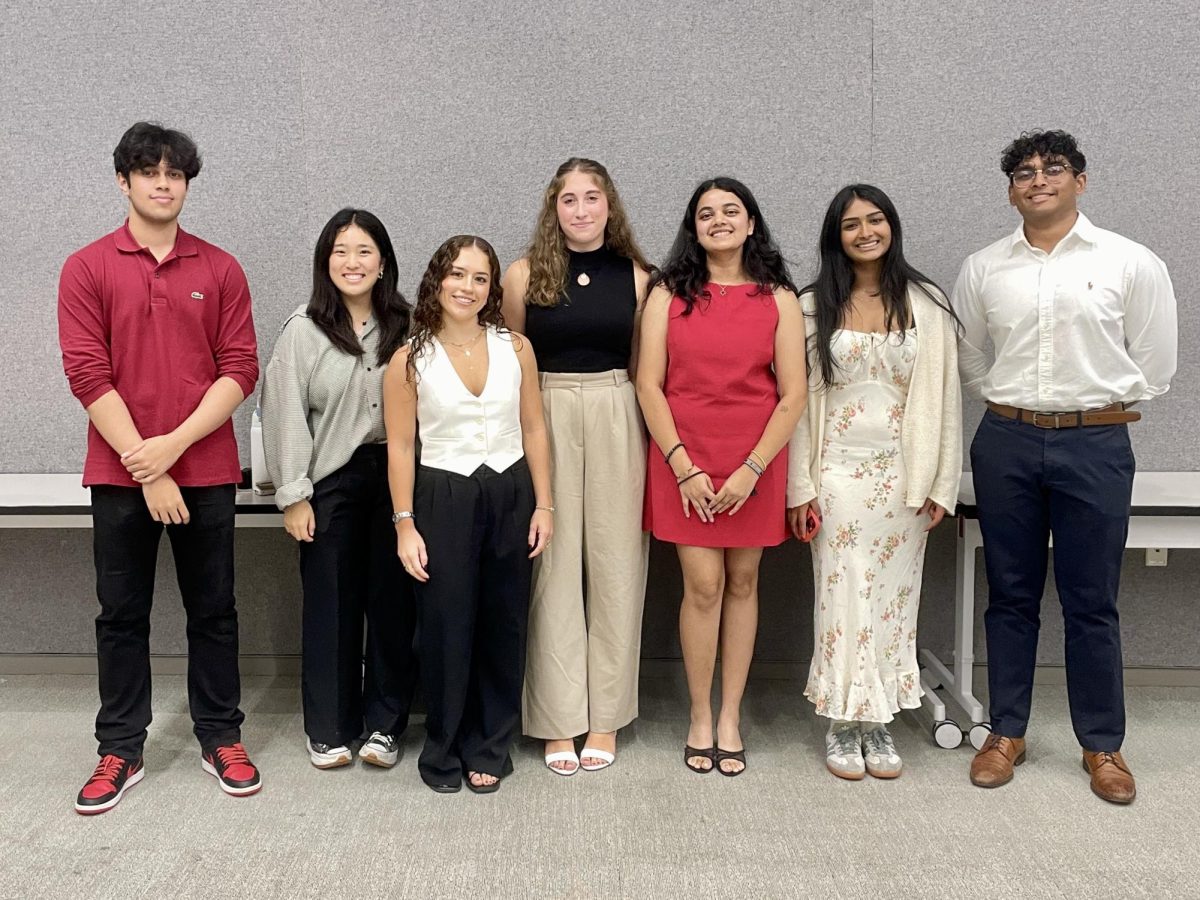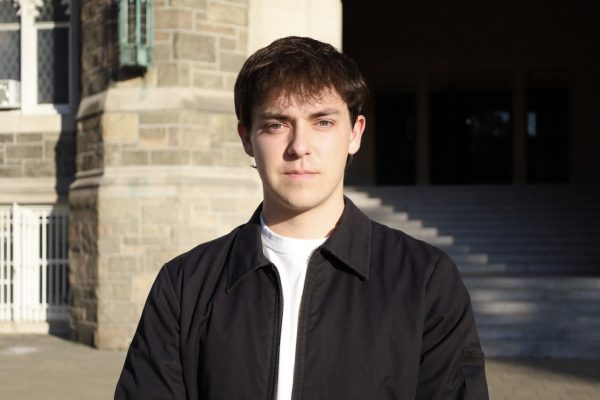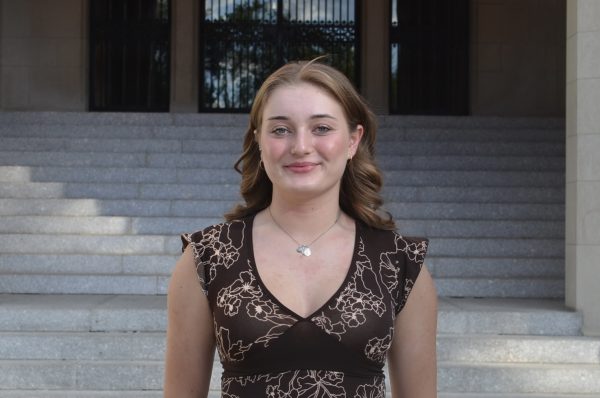On Friday, Sept. 13, the Fordham University United Student Government (USG) hosted a Meet the Candidates night for the Fordham College at Rose Hill (FCRH) and Gabelli School of Business (GSB) Class of 2028 Senate candidates. Executive President of USG Lucas Hjertberg, FCRH ’26, and Executive Vice President Eron Maltzman, GSB ’25, led the event.
There are eight candidates in total, split evenly between FCRH and GSB. However, Anshuman Shrivastav, GSB ’28, was unable to attend. According to the USG website, “The USG Senate is made up of 4 class councils with 5 senate seats on each. Each class elects 2 FCRH and 2 Gabelli senators with the 5th seat acting as a swing for the next candidate with the highest votes, regardless of school.”
Each candidate was allotted two minutes to present their platform. Following candidate presentations, The Fordham Ram asked questions about their platforms. The audience was not given the opportunity to ask questions.
George Mampillil, FCRH ’28, was the first to present his candidate position. Mampillil is active in the Bronx community, including weekly attendance at a church 15 minutes away from campus. Mampillil stated that he plans to improve student life by connecting with school services and organizations and publishing polls for students to share concerns in case they cannot attend meetings. He also hopes to increase school spirit by making events more enjoyable to the student body. When asked about examples of events he had organized, he mentioned a successful spikeball tournament at his high school as post-COVID-19 engagement. Mampillil was also asked about his reason for using USG to conduct events instead of collaborating with clubs like the Campus Activities Board or Residence Halls Association. In response, Mampillil stated he would prefer to prioritize events through USG, using their budget, instead of through other campus clubs. However, he was open to collaboration if it resulted in higher participation.
Tina Pathak, FCRH ’28, a former president of her high school Model UN, presented next. Pathak stated that she plans to focus on student representation and academic expansion. For the former, she plans to use suggestion boxes and events to gather student input and emphasize the importance of student body opinions. Pathak plans to expand access to career counseling and internship opportunities, balancing the amount of resources given to FCRH compared to Gabelli. According to her campaign’s Instagram page, she supports “course expansion and specialized programs.” However, this initiative was absent from the candidate platform description required by USG prior to the event. When asked, Pathak specified that she is advocating for creating additional, in-depth courses as more difficult equivalents to classes that AP credits might have already satisfied.
Grace Shin, FCRH ’28, cited her experience in student government starting in second grade and, most recently, as her high school’s student body vice president. Shin plans to implement “calming rooms” at Fordham, similar to the ones in her high school. It would include “calming items” and potentially therapists during high-stress periods, such as finals. Her platform includes initiatives for clear communication with the student body, specifically the Class of 2028, of events and opportunities on campus. She also hopes to lower the price of textbooks, homework resources and lab fees for STEM students. When asked about her approach to reducing textbook prices, Shin stated that, as a biology major, she has personally spent over $600 on textbooks and other required materials. She did not discuss plans for this initiative beyond general advocacy through USG.
Audrey Schooner, FCRH ’28, had previously acted as class president of her high school’s student body government for two years, one on the executive board and the other as the executive president. Her platform focuses on mental health support, sustainability and communication between USG and the student body. Schooner would like to expand mental health crisis support by partnering with apps such as BetterHelp to provide students with help outside the hours of Counseling and Psychological Services, stating that “mental health is not a 9-5.” Additionally, she proposes the reduction of single-use plastics such as straws and utensils on campus. Schooner suggests a gradual shift to biodegradable alternatives when asked about her plan to achieve this. She also wants to improve awareness of USG’s open hours and services while implementing one-on-one meetings and personal dialogue to “meet students where they are.”
Sarah Bayas, GSB ’28, was executive president in her senior year of high school. Her platform focuses on creating a welcoming environment at Fordham, learning more about Fordham’s processes before proposing specific changes and addressing student needs and desires above imposing pre-determined initiatives. Regarding student needs, Bayas would like to create more opportunities for student input and engagement, particularly by creating committees to address students’ specific issues. Additionally, she has some initial ideas, such as improving the orientation process to integrate students better and enhancing communication about available resources and campus layout.
Anoushka Awasthi, GSB ’28, is an international student from India with leadership experience as editor-in-chief of her high school’s economics magazine. She plans to organize events on campus to raise money for sustainable initiatives. She hopes to support career development by organizing talks from specific industry experts to help students choose majors and understand potential career paths. Awasthi aims to use her experience as an international student to improve support for other international students. When asked about specific ways to do this, she suggested inviting more international speakers to Fordham. Awasthi plans to organize fundraising events through the USG to support sustainable initiatives. However, she did not provide specific examples of the initiatives these events might fund.
Aniruddha Sankar, GSB ’28, is an international student from Mumbai who served as the executive president during his senior year of high school, where he led fundraising efforts. Sankar suggests that orientation could have done more to integrate students. When asked to expand upon this position, he said he believes orientation could have been more concise. He would have hoped for a better explanation of campus resources and layout. He plans to restructure orientation if elected. However, moderators mentioned that the New Student Orientation club manages orientation, not USG. One of Sankar’s primary goals is to further Fordham’s commitment to solar energy by increasing the number of solar panels on campus. When asked about the plan to expand Fordham’s system, Sankar proposed adding more panels to “campus buildings and lawns and map the panels using professional architects.” He also proposed composting initiatives around campus, including inside dorms.
Anushman Shrivastav, GSB ’28, was unable to attend. Their platform centers on the “Community Liaison Program” that pairs commuter or off-campus students with on-campus peers to share information about events or other campus activities. Additionally, they plan to improve dorm life by gathering feedback and organizing inter-dorm activities.
Voting opened Monday, Sept. 16, and closed Tuesday, Sept. 17. The new senators for the Class of 2028 will join USG for the first time on Thursday, Sept. 19.










































































































































































































